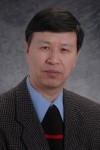Forcing the nucleus of a living cell to respond
Mechanical forces exert the profound impact on living cells, tissues, and organisms but the underlying mechanisms are not well understood. Here we present evidence that nuclear structures can be directly deformed by a local surface force (of physiologic amplitudes and frequency) applied via integrins. Utilizing a 3D-MTC technique, we applied stresses via different directions and found anisotropic responses (both mechanical and biological) in the nucleus of a living cell. We will discuss implications of these findings in stem cell differentiation and cancer progression and unanswered questions.
Bio
 Professor Ning Wang is the Leonard C and Mary Lou Hoeft Endowed Professor in Engineering and Professor of Mechanical Science and Engineering at University of Illinois at Urbana-Champaign. Professor Wang conducts research in the area of biomechanics and mechanobiology for more than 30 years using novel experimental technologies and theoretical analyses. Professor Wang and colleagues developed the Magnetic Twisting Cytometry (MTC) technology for probing a single cell’s mechanical properties and discovered in 1993 that cell-matrix adhesion molecules-integrins are mechanosensors. He provided first experimental evidence that cell prestress regulates cell shear stiffness and controls gene expression in early 2000’s. He developed three-dimensional (3D) MTC technology to quantify mechanical anisotropy and the intracellular strain tomography technology in 2004.
Professor Ning Wang is the Leonard C and Mary Lou Hoeft Endowed Professor in Engineering and Professor of Mechanical Science and Engineering at University of Illinois at Urbana-Champaign. Professor Wang conducts research in the area of biomechanics and mechanobiology for more than 30 years using novel experimental technologies and theoretical analyses. Professor Wang and colleagues developed the Magnetic Twisting Cytometry (MTC) technology for probing a single cell’s mechanical properties and discovered in 1993 that cell-matrix adhesion molecules-integrins are mechanosensors. He provided first experimental evidence that cell prestress regulates cell shear stiffness and controls gene expression in early 2000’s. He developed three-dimensional (3D) MTC technology to quantify mechanical anisotropy and the intracellular strain tomography technology in 2004.
In 2008, Professor Wang’s laboratory discovered fundamental differences between mechanical force-based signaling and soluble growth factor-based signal transduction inside a cell. Professor Wang’s ongoing research covers stem cell biology and cancer cell biology. His laboratory has discovered that an embryonic stem cell (ESC) differentiates in response to small forces and that organized germ layers can be generated from a single ESC when in vivo physiological microenvironments are simulated. Professor Wang’s laboratory has developed a novel mechanical method that selects a minor subpopulation of cancer cells that are highly efficient in metastasis and elucidated mechanisms that regulate plasticity of these tumor-repopulating cells.
Professor Wang holds Sc.D. degree in Physiology from Harvard University in 1990 and M.S. and B.S. degrees in biomechanics from Huazhong University of Science and Technology in China.
